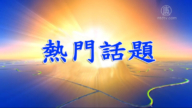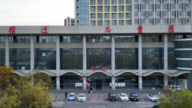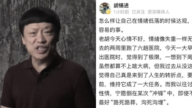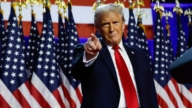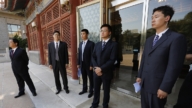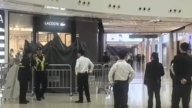【新唐人2012年1月19日讯】美国驻华大使骆家辉,日前接受美国公共电视台节目采访时表示,中国的异议份子、律师和其他维权人士频频遭到打压和拘禁。中国人权状况目前显然在“走下坡和日益恶化”。然而,针对骆家辉的评论,中共又推出外交部为此辩驳。民主人士认为,中共外交部就是中共的一块遮羞布。
美国驻华大使骆家辉周一(1月16号)晚,在美国公共电视台的“查理•罗斯访谈”节目中说,自2008年以后,中国的人权环境起起伏伏,中国似乎处在一个下坡期,状况在不断恶化,人权状况令美国越来越担心。
针对骆家辉的评论,17号,中共外交部发言人刘为民在例行记者会上,反驳骆家辉的指责。
大陆民主人士来金彪表示,中共外交部是中共的一块遮羞布。他说,在中国根本就没有人权。
来金彪:“中共到目前为止,它对自己所犯下的罪行,或者说的好听一点,它对自己所犯下的错误,从来没有承认过。它所说的一切,所做的一切,无非就是想让它自己的心理得到一种安慰,并且让你们认为它做的是对的,让你们无论如何要相信它。”
浙江独立观察人士昝爱宗认为,中国民众的权利受到很多的压制,骆家辉指责中国人权的恶化和退步是有道理的。
昝爱宗:“对于那种游行、示威、这种集会,这种权利的压制比以前更厉害。现在好多聚会活动都会被禁止,因为网上我也看到了一条消息说,有些地方的年夜饭都要有备案制,就是说要备案。”
骆家辉还特别指出,自从去年埃及、利比亚掀起“阿拉伯之春”运动以来,中共领导人很担心类似事件在中国发生。因此,中国的异议份子、律师和其他维权人士频频遭到打压和拘禁。
几天前,北京社会活动家胡佳、浙江民主人士邹巍、吕耿松、魏桢凌等先后遭当局抄家和传唤。
去年年底,57岁的贵州维权活跃份子陈西,因为通过网际网路传送倡议民主的文章,被中共当局指说有煽动颠覆内容,因此陈西被中共以“煽动颠覆国家政权罪”判刑10年。
同一个月,另一名四川维权人士陈卫,也是因为在网路上写文章,被四川遂宁中级法庭以“颠覆国家政权罪”判处9年徒刑。
然而,刘为民为此辩驳说,一些公民受到法律制裁,不是因为中共压制言论自由或宗教自由,而是这些人违反了中国法律的底线,因此受到惩罚。
昝爱宗:“其实从宪法的角度上来说,公民有言论、出版、集会、游行、结社等各种权利,他在行使他的宪法权利,也没有触犯法律的底线。”
北京维权律师李和平表示,中共以“煽动颠覆国家政权罪”对大陆异议人士判刑,但这个条文本身就是犯罪。如果按照这个条文,去追究中国公民因为某一些言论、思想是犯罪行为的话,那就是违反了中国的宪法。
新唐人记者唐睿、肖颜采访报导。
———————
China’s Communist Regime Negates Claim of Deteriorating Human Rights
Anchor: In a recent interview with public television, U.S.
Ambassador to China, Gary Locke, expressed that
“There’s a significant crackdown and repression going on in
China” towards the dissidents, lawyers and other activists.
The human rights situation in China is apparently in
“a down period” and “it’s getting worse.”
The communist regime once again disputes Gary Locke’s
comments via the Foreign Ministry.
Democratic activists indicate that the Chinese Ministry of
Foreign Affairs is a fig leaf of CCP.
In the PBS television show “Charlie Rose” on Monday,
January 16th, the U.S. Ambassador to China, Gary Locke,
said that since 2008, China’s human rights climate has always
ebbed and flowed up and down, and appears to be worsening.
In response to Locke’s comments, at a regular press conference
on the 17th,
the Chinese Foreign Ministry spokesman Liu Weimin
refuted Locke’s accusations.
Lai Jinbiao, a democratic activist in China, refers to the Chinese Foreign Ministry as the CCP’s fig leaf.
He says human rights simply do not exist in China.
Lai Jinbiao : “So far, CCP has not admitted any
of its own crimes, or to say it nicely, its own mistakes.
Everything it says or does is nothing more than to comfort
themselves, and make you think what it does is right, and you have to believe it no matter what."
Zan Aizhong, an independent observer in Zhejiang, thinks that
many Chinese rights have been suppressed, and
what Locke says about the deterioration and regression of the
Chinese human rights are justified.
Zan Aizong : “The suppression of demonstrations, protests,
and assembly is far worse than before.
Many meetings and activities are prohibited.
I also saw news saying even New Year’s Eve dinner in certain
areas needs to be reported, that is, it needs to be on record."
Gary Locke also pointed out that since the Arab Spring
last year in Egypt and Libya,
“the Chinese leaders are very fearful of something similar
happening within China.”
“Therefore, there is a significant crackdown on the dissention,
political discussion,
even the rights and activities of lawyers who advocate on
behalf of people who have been poisoned from tainted food and medicine.”
A few days ago, Beijing activist Hu Jia, Zhejiang democratic
activists Zou Wei, Lu Gengsong, Wei Zhenling and so on,
have been raided and summoned by the police
one after another.
Late last year, the 57-year-old Guizhou activist Chen Xi
was charged with “inciting subversion of state power” for
his online article prompting democracy and
was sentenced to 10 years.
In the same month, another activist in Sichuan, Chen Wei, was
also sentenced to nine years in prison with the charge of “subversion of state power” for an online article he proposed.
However, the Chinese Foreign Ministry spokesman Liu
Weimin rebutted that a number of citizens were subjected to legal sanctions,
not because the Chinese Communists suppress freedom of
speech or religion, but these people have been punished for breaking the Chinese law.
Zan Aizong : “In fact, from the standpoint of the Constitution,
citizens have the freedom of speech, press, assembly, demonstration and association.
They are exercising their constitutional rights, and
they have not violated the bottom line of the law."
Beijing human rights lawyer Li Heping said that the CCP have
been sentencing dissidents for “inciting subversion of state power."
However, this provision itself is a crime.
If Chinese citizens speech and thoughts are a crime based on
investigation in accordance with this provision,
then it is a violation of China’s Constitution.’
NTD reporters Rui Tang and Xiao Yan


